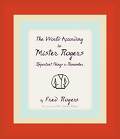

One winter quarter in college, I got depressed and the one thing that made me feel better was watching Mr. Roger’s Neighborhood, despite the fact that I was probably 20. It just felt warm and good and helped get me out of my funk. As a little kid growing up in Western PA, it never occurred to me that people everywhere watched Mr. Roger’s—it just seemed like a local Pittsburgh show (it was). After losing my Father in June, I knew I would turn to a book to help me begin to deal with the loss. People made several kind suggestions and other books seemed to be exactly what I should be reading at a time like this (Kushner’s When Bad Things Happen to Good People came to mind). Instead, I turned to Mr. Rogers. These two books, one a collection of quotes by Fred Rogers and the other, the story of a friendship between a Texas journalist and Mr. Rogers really were helpful to me. From what I have learned, it seems like Fred really walked the walk and lived his life according to some very basic principles-- respect, honesty, faith, fairness, love—all those things he dealt with on his show for all those years. To buy into the caricature of Fred Rogers (“Can you say ‘dandelion’? I knew you could.”) is a mistake. It seems to me that Fred was the embodiment of the religious principles he held close and it gave me a lot to think about. Hokey as it sounds, I really believe the world is a decidedly better place because of him.








